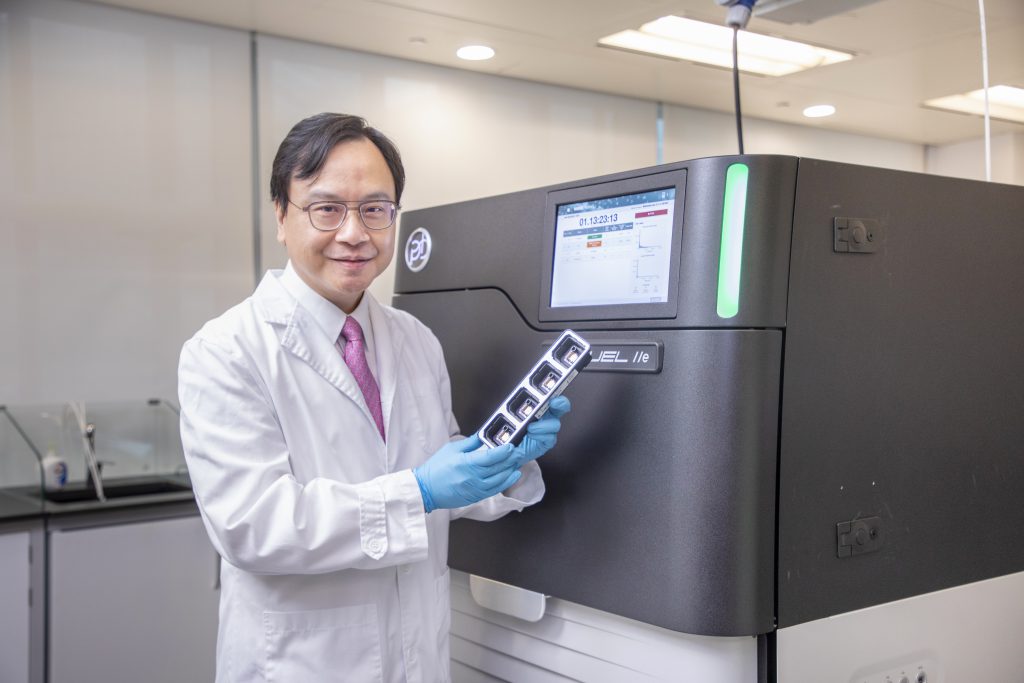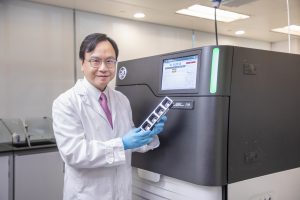Unlocking the body’s secrets with a drop of blood
Unlocking the body’s secrets with a drop of blood
With a single drop of blood, we can diagnose whether a foetus has any genetic disorders or identify infections, and even detect occult cancers. Professor Dennis Lo, known as the “Father of Non-Invasive Prenatal Testing”, has pioneered the diagnostics applications of the presence of foetal DNA in cell-free plasma of pregnant women. The cell-free DNA testing technology, also referred to as liquid biopsy, was initially applied by his team to prenatal testing and subsequently adapted to use in numerous other applications that unveil the secrets of the body, obviating the needs for invasive tissue biopsy. In recent years, Professor Lo, as a clinician-scientist-entrepreneur, has been keen to translate his inventions from laboratory to market by developing commercially successful and clinically useful diagnostics tools that have the potential to change the world for the better.
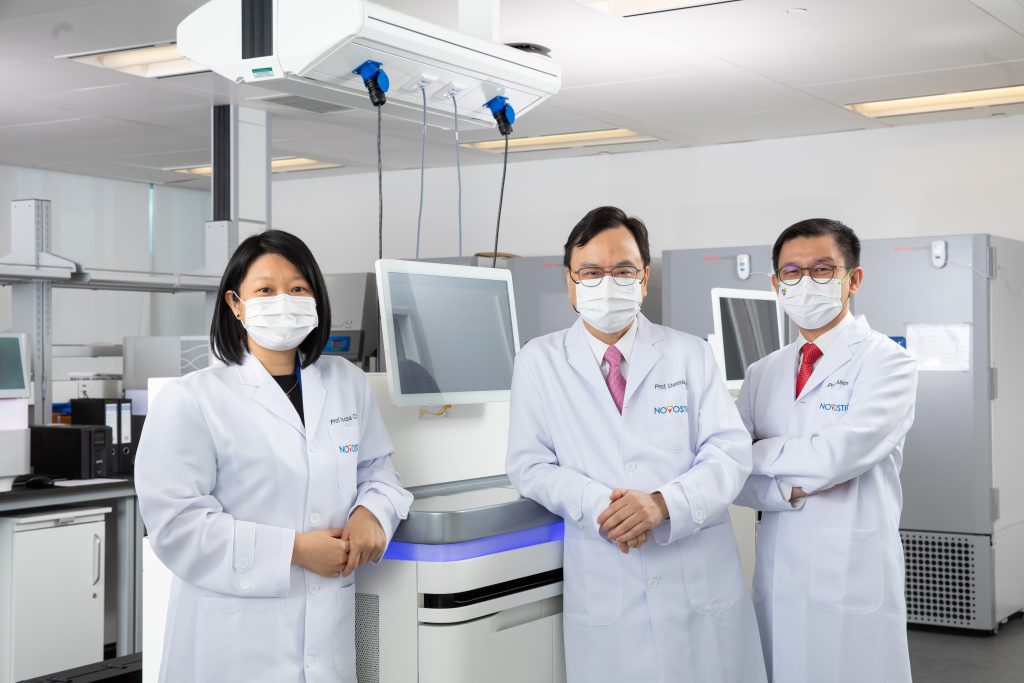
Professor Rossa Chiu (left) and Professor Allen Chan (right) were Professor Lo’s PhD students. They have been working together for over two decades. All three of them have been named among the “Top 20 Translational Researchers of 2020” by Nature Biotechnology. The authoritative scientific journal highlighted their work on the development of a new class of prenatal and cancer diagnostic markers based on DNA methylation.
Liquid biopsy allows non-invasive detection of dozens of cancers
Professor Lo translated the research findings into an approach to conducting non-invasive prenatal tests (NIPT) for Down Syndrome detection in 2011. The NIPT is currently used globally with millions of tests performed each year. Its core technique, liquid biopsy, is a technology that analyses cell-free DNA in blood plasma. It is used as a diagnostic tool for early detection of genetic disorders caused by single-gene defects or chromosomal abnormalities, such as Down Syndrome, Thalassaemia and Duchenne muscular dystrophy. It can also be applied to detect bacterial infections, monitor organ transplant rejection, and screen for a dozen types of cancers, including nasopharyngeal carcinoma.
“76% of nasopharyngeal cancer patients in Hong Kong are diagnosed at advanced stages, when treatment options can be limited. With this screening test developed, it is hopeful that around 70% of patients can be detected during the early stages and in turn the mortality rate can be substantially reduced,” said Professor Lo.
He added that the research environment of The Chinese University of Hong Kong (CUHK) and seamless collaborations within the team provide the perfect soil for innovation. “Professor Rossa Chiu in our team has an excellent command of language and strong organisational skills. She and Professor Allen Chan, who has exceptional numerical abilities, have converted many of my ideas into reality. For example, I spent three years thinking how to precisely and accurately distinguish and detect the DNA of a foetus in plasma. In the end, my team and I managed to make a major breakthrough by using a statistical theory.”
Exploring new frontiers in epigenetics
Plasma DNA-based molecular diagnostics has a huge range of potential applications, but it still has its limitations. For example, epigenetics involves modifications that impact gene activity without altering the DNA sequence. In a scenario like this, other diagnostics approaches have to be developed to detect changes when DNA sequences are identical. “It has been discovered that children of mothers who endure famine during pregnancy have a higher chance of developing obsesity and diabetes in adulthood,” said Professor Lo. “Similarly, stressful events during pregnancy in mice increase anxiety in offspring as they grow. These traits are actually results of epigenetic changes. In other words, ‘foetal education’, as Chinese people refer to it, can perhaps be explained and explored scientifically using epigenetic approaches.”
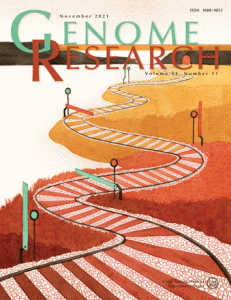
Genome Research, an international scientific journal, published a research paper on plasma DNA methylation by Professor Lo. The cover of the issue was conceptualised by Professor Lo and drawn by Hong Kong artist Carman Ng. The track symbolises DNA, the red tunnel blood vessels, and the red and green posts epigenetic changes, showing the relation between enzymatic cutting of DNA, epigenetics and plasma DNA.
There are billions of cells inside the human body that have identical sequences but carry out different functions. “We have developed a technology that can effectively detect epigenetic inheritance. Unlike conventional methods, which damage 90% of the DNA, the new technology achieves 90% detection accuracy while being able to analyse long DNA molecules,” said Professor Lo. “CUHK has always promoted an innovative and entrepreneurial culture, whereby scientists and researchers are encouraged to translate their research findings into applications for commercialisation. In this way, we can obtain more resources and flexibility in comparison to working within the university campus. We can take bold steps and explore new horizons.”
In addition to teamwork, support from CUHK and other partners is an important factor in the team’s success. “In 2006, CUHK and Sun Yat-sen University jointly founded the State Key Laboratory in Oncology (now State Key Laboratory of Translational Oncology), with a research focus on developing novel diagnostics and therapeutics for various cancers that are prevalent in Asia. It was then that we worked on applying the technology of liquid biopsy to detect nasopharyngeal cancer. To date, we have nearly 1,500 patents in different jurisdictions all over the world.”
To Professor Lo, this growing portfolio of patents is both an affirmation of the work of his team and the key that opens the door to a new world. Over the past few years, CUHK has been advocating for effective collaboration among the industry, academic and research sectors. Through commercialisation of the research findings, academic researchers can understand the market needs, attract investors, and further increase the value of the research results from a social and economic perspective.
In the past decade, Professor Lo has set up several companies, of which three have been acquired or had capital injected by listed companies. In the future, he plans to gain a foothold in the Greater Bay Area by setting up a company focusing on detecting nasopharyngeal cancer. “The Greater Bay Area is a key focus of Hong Kong’s development. With a population of over 80 million, there are plenty of challenges but also opportunities,” he said. Professor Lo has also established the Centre for Novostics under the InnoHK initiative, where he leads his CUHK team as they conduct collaborative research with world renowned universities and research institutes.
“Whether you are a scientist or an entrepreneur in the healthcare sector, the eventual aim is always to work for a better and healthier life for mankind. I strongly believe that if you keep this in mind, you will succeed at the end of the day.”
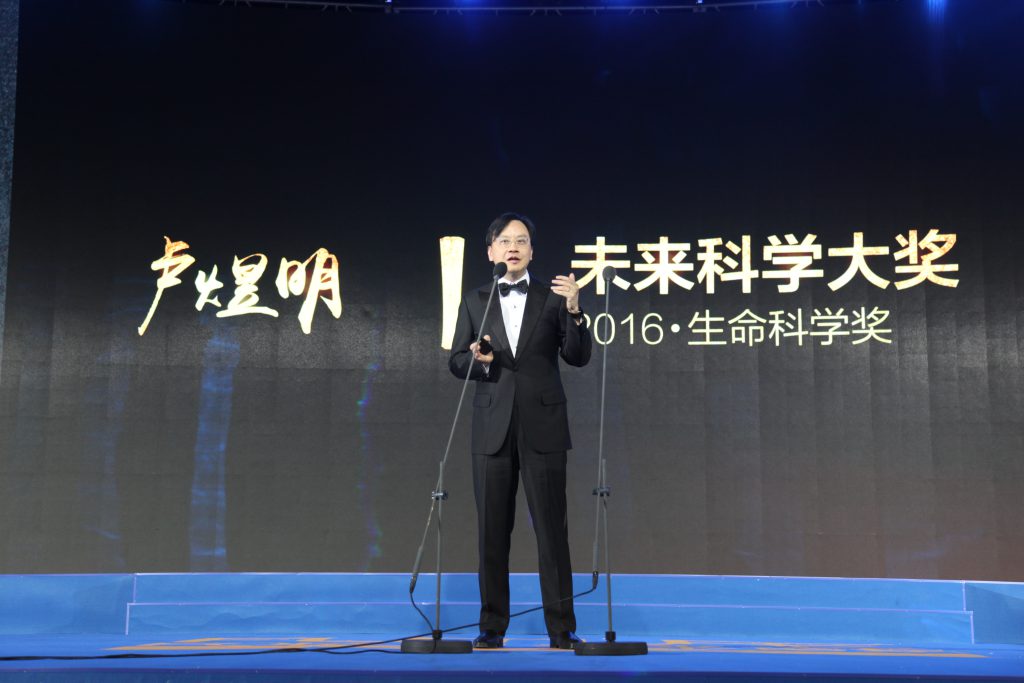
Professor Lo receives the first Future Science Prize – Life Science Prize.
— Professor LO Yuk Ming, Dennis
Chairman, Department of Chemical Pathology
Li Ka Shing Professor of Medicine, CUHK
Research areas: DNA non-invasive liquid biopsy
Major achievements:
- Breakthrough Prize (2021)
- Royal Medal (2021)
- Top 20 Translational Researchers, Nature Biotechnology (2016-2020)
- Fudan-Zhongzhi Science Award (2019)
- Thomson Reuters Citation Laureate (2016)
- Future Science Prize – Life Science Prize (2016)
- AACC Wallace H. Coulter Lectureship Award (2015)
- King Faisal International Prize for Medicine (2014)


